#lessonface
Explore tagged Tumblr posts
Text
Join me for the piano class ,, Beginner Piano For Adults and Teens'', every Sunday at 7 PM, UK time
Space is limited. Enroll now to reserve your spot here : https://www.lessonface.com/apply/beginner-piano-adults-and-teens
#gabriellatis#piano lessons#lessonface#grouppianoclass#piano lessons near me#piano lessons for adults#piano lesson for all ages
0 notes
Text
How to Become a Musician: The Importance of Networking
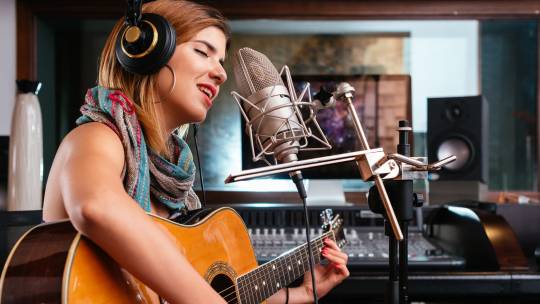
Networking is a critical aspect of becoming a successful musician. This article highlights the importance of networking and provides tips on how to do it effectively.
Becoming a musician is a dream many hold dear, but it requires dedication, practice, and a solid plan. Whether you’re inspired by the soulful sounds of jazz, the electrifying beats of rock, or the harmonious melodies of classical music, this guide will take you through the essential steps to start your musical journey. By following these steps, you’ll not only develop your musical skills but also find joy and fulfillment in the art of making music.
1. Identifying Your Passion
The first step in becoming a musician is to identify your passion. Music is a vast field with numerous instruments and vocal styles. Take time to explore different genres and instruments. Listen to various artists and attend live performances to understand what resonates with you.
Instrument Selection: Whether it’s the guitar, piano, violin, drums, or your own voice, choosing an instrument that excites you is crucial. Visit a music store or a friend who plays an instrument to get a feel for different options.
Genre Exploration: Explore different music genres like rock, jazz, classical, pop, and blues. Each genre has its unique characteristics and learning one that aligns with your taste can make the journey enjoyable.
2. Setting Goals
Once you’ve identified your passion, the next step is to set clear, achievable goals. Having goals keeps you motivated and gives you a sense of direction.
Short-Term Goals: These could include learning a particular song, mastering a new chord, or practicing for a certain number of hours each week.
Long-Term Goals: Long-term goals might involve performing at a local event, joining a band, or composing your own music. Write down your goals and track your progress regularly.
3. Learning the Basics
Understanding the basics of music is essential. This includes learning to read music, understanding rhythm, and knowing how to play your chosen instrument.
Enroll in Music Classes: Find a local music school or a private tutor. Formal education provides structured learning and personal guidance.
Online Resources: There are numerous online tutorials, courses, and apps that offer lessons in music theory and practice for beginners. Websites like YouTube, Coursera, and Udemy have excellent resources for aspiring musicians.
4. Practice Routine
Practicing regularly is key to improving your skills. Consistency is more important than the length of each practice session.
Daily Practice: Aim to practice every day, even if it’s just for 20–30 minutes. Regular practice helps in building muscle memory and improving technique.
Structured Sessions: Divide your practice time into sections — warm-up exercises, scales, new material, and revisiting older pieces. This ensures a balanced improvement across different areas.
5. Finding a Mentor
Having a mentor can significantly accelerate your learning process. A mentor provides personalized guidance, shares valuable insights, and helps you avoid common mistakes.
Local Mentors: Look for experienced musicians in your community. They could be music teachers, local band members, or even friends who are proficient in music.
Online Mentorship: Many platforms offer virtual mentorship programs. Websites like Lessonface and TakeLessons connect you with experienced musicians for one-on-one sessions.
6. Joining a Community
Being part of a music community provides support, inspiration, and opportunities to collaborate with other musicians.
Local Groups: Join local music clubs, bands, or orchestras. Participating in group activities can boost your confidence and expose you to different playing styles.
Online Forums: Platforms like Reddit, Facebook, and dedicated music forums are great places to connect with other musicians, share your progress, and seek advice.
7. Embracing the Journey
Finally, remember that becoming a musician is a journey, not a destination. Celebrate your progress, no matter how small, and stay passionate about your music.
Celebrate Milestones: Acknowledge and celebrate your achievements. Whether it’s mastering a difficult piece or performing in front of an audience, every milestone is a step forward.
Stay Inspired: Keep listening to music, attend concerts, and engage with other musicians to stay inspired and motivated.
Becoming a musician is a rewarding journey that requires persistence. By identifying your passion, setting goals, learning the basics, practicing regularly, finding a mentor, and joining a community, you’ll be well on your way to achieving your musical dreams. Stay committed to your goals, and the results will follow. Remember, every great musician started as a beginner, and with dedication and hard work, you can achieve your musical aspirations.
Share your musical journey or tips for beginners in the comments below! What inspired you to start playing music? What challenges have you faced, and how did you overcome them? Your experiences could inspire and help others who are just starting out.
Ready to start your musical journey? Click here to enroll and take the first step towards becoming the musician you’ve always dreamed of!| Here are some related articles for you:
upload-music-on-amazon-music how-to-increase-your-chances-of-getting-on? 10-tips-to-get-your-music-on-discover-weekly-release-radar
0 notes
Text
How to Find Music Teachers
Local Music Schools and Academies: Check out reputable music schools or academies in your local area. They often have experienced and qualified music teachers.
Online Platforms: Explore online platforms dedicated to music education, such as websites that connect students with music teachers. Examples include Lessonface, TakeLessons, and Superprof.
Music Conservatories and Universities: Many renowned musicians and educators teach at music conservatories and universities. Research faculty members at well-known institutions for potential private lessons or workshops.
Ask for Recommendations: Seek recommendations from fellow musicians, friends, or local music communities. Personal referrals can lead you to skilled and respected music teachers.
Music Conferences and Workshops: Attend music conferences, workshops, or masterclasses. This is an excellent way to discover teachers who are actively involved in the music community.
Online Reviews and Testimonials: If you're considering online lessons, read reviews and testimonials from students who have worked with specific music teachers. This can provide insights into the teacher's effectiveness.
Social Media and Online Presence: Many music teachers have a strong online presence. Look for teachers on social media platforms, professional websites, or platforms like YouTube, where they might share educational content.
Local Music Stores: Inquire at local music stores, as they often have information about reputable music teachers in the community.
Professional Organizations: Explore professional organizations related to music education, such as the Music Teachers National Association (MTNA) in the United States. These organizations may have directories of qualified teachers.
Artists and Performers: Some accomplished musicians also offer private lessons. Check if your favorite artists or local performers provide teaching services.
Remember to consider your specific needs, goals, and the style of music you want to learn when searching for a music teacher. Additionally, verify the teacher's credentials, experience, and teaching methods to ensure they align with your preferences and learning style.
Music teachers play a pivotal role in shaping the musical journey of aspiring musicians, imparting knowledge, fostering skill development, and inspiring a lifelong appreciation for music. These dedicated educators work with students of all ages and skill levels, providing guidance in various musical disciplines such as instrumental and vocal performance, music theory, composition, and more.
Music teachers are skilled professionals who share a passion for music and a commitment to nurturing the talents of their students. Whether teaching in schools, private studios, or online platforms, they serve as mentors, imparting not only technical expertise but also instilling a deep understanding and love for the art of music.
Call 91-8017517171 for learning keyboard, harmonica, flute, Spanish guitar and get certificate
0 notes
Text
status : closed for @nisafm setting : blethan’s garage


ANOTHER DAY, ANOTHER REHEARSAL. it’s good work, trip thinks, the band’s signs of improvement all right there in his diminishing page of mental notes. after their last set, he only has minor critiques : one missed cue, some subpar energy, a slightly off - beat note here and there. little things— nitpicks, really, easily chalked up to exhaustion and over - practice ( if you believe in the concept ). however, it’s those “ little things ” that separate a good band from a great one, and with john corrigan and possibly butch vig on the line, runaway yesterday needs to be better than great. they need to be perfect.
he zeroes in on nisa specifically, approaching her with a look in his eye she should be all too familiar with by now. ❝ you’re playing it too high on the frets, ❞ he states it simply, matter - of - fact, wasting no time on pleasantries and jumping right into the meat of it all. ❝ it’s making songs lose texture, so be sure to keep it in the money zone close to the head. ❞
#* | bouquet of clumsy words ( threads )#nisafm#nisa sunay 05#shoutout to the bass players on talkbass(dot)com for letting me read their lil forums and pick their lil brains#and also to yonit spiegelman for her bass tip videos on lessonface which i stole trip's critique from directly#everything else i am literally talking out of my ass and should not be taken seriously
7 notes
·
View notes
Photo
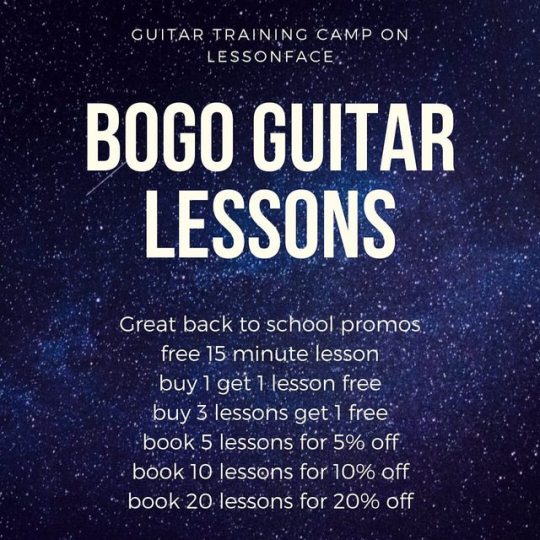
For more info about these great guitar, bass, and ukulele deals the link is in my profile. It will be the first link on the page. DM me if you have questions. https://www.lessonface.com/instructor/christopher-rupp?ref=2f77cd8c #bogo #guitarlessonsonline #onlineguitarlessons #guitarlessons #bassguitarlessons #ukulelelessons #guitartrainingcamp #guitarmy #guitartrainingcamponline #chrisrupp #coupons #ilovecoupons #lessonface #learnguitar #learnguitaronline #learnbassguitar #learnukulele #deals #studentstyle #studentsuccess #backtoschool #backtoschoolshopping#playguitar #homeschool #homeschoolroom #homeschoolmom #homeschoolfamily #skillshareteacher #skillshare https://www.instagram.com/p/B1HItUcHFHq/?igshid=15xfxmdd8ad13
#bogo#guitarlessonsonline#onlineguitarlessons#guitarlessons#bassguitarlessons#ukulelelessons#guitartrainingcamp#guitarmy#guitartrainingcamponline#chrisrupp#coupons#ilovecoupons#lessonface#learnguitar#learnguitaronline#learnbassguitar#learnukulele#deals#studentstyle#studentsuccess#backtoschool#backtoschoolshopping#playguitar#homeschool#homeschoolroom#homeschoolmom#homeschoolfamily#skillshareteacher#skillshare
0 notes
Video
youtube
Mandolin Vitamin 1: Learn your first scale and song
Lessonface.com connects students to great teachers for live lessons online. 30-sec video of how it works, with kitten: https://youtu.be/xjS-9Zpptc0
0 notes
Text
Online Music Education Market demand, Trend Key Major Challenges, Drivers, Growth Opportunities Analysis 2022-2027
The latest study from Astute Analytica examines the global Online Music Education Market for the forecast period from 2022 to 2027. The report offers an in-depth analysis of top industry trends, market dynamics, and competitive dynamics. Astute Analytica delivers business insight and consulting services to help its clients achieve sustainable growth. The analysis reports are useful for retrieving information and making business decisions.
Request Sample Report for Online Music Education Market: https://www.astuteanalytica.com/request-sample/online-music-education-market
The global Online Music Education Market size was US$ 130.7 million in 2021. The global Online Music Education Market size is forecast to reach US$ 421.9 million by 2027, growing at a compound annual growth rate (CAGR) of 18.4% during the forecast period from 2022 to 2027.
The Online Music Education Market research report analyzes industry trends, growth patterns, and research methodologies. It also analyzes the factors that influence market growth, including manufacturing strategies, product optimization, and customer retention.
Among the significant factors analyzed in the study are capacity, costs, production, revenue, production rate, consumption, import/export, supply/demand, gross, market share, CAGR, capacity utilization rate, and gross margin.
Impact Analysis of COVID-19:
The impact of the COVID-19 pandemic outbreak appeared to slow global revenue growth. It is evident that life, businesses, and economies have transformed in the past year--a process reflected in revenue increases and decreases. A disruption in production and a slowing demand was evident as workers went home, travel restrictions took place, and delay in raw materials supply. The effects of the pandemic on supply have been most visible. During the early days of the pandemic, companies in the worst-hit countries or companies dependent on supply chains in those countries suffered severely.
Regional Insights:
The report highlights key factors such as R&D, new product launches, M&A, agreements, partnerships, joint ventures, collaborations, and growth of key industry participants from a regional and global perspective. The report covers the regions of North America, Asia Pacific, Europe, Middle East & Africa, and South America. Additionally, the report offers country-level estimates for 25+ countries, including the US, Germany, UK, Japan, China, India, the UAE, South Korea, South Africa, and the Middle East. The regional analysis presents information at the regional and country-level about the market, including the market dynamics based on the segments covered in the report.
Customization of the Report:
This report can be customized to meet the client's requirements. Please connect with our sales team ([email protected]), who will ensure that you get a report that suits your needs. You can also get in touch with our executives on +18884296757 to share your research requirements.
Request Sample Report for Online Music Education Market: https://www.astuteanalytica.com/request-sample/online-music-education-market
Leading Competitors:
The leading prominent companies profiled in the global Online Music Education Market are:
Berklee College of Music, The Juilliard School, Lessonface, Moosiko, MusicGurus, AAFT School, VIP Peilian, Skoove, Lessonface.com, Point Blank, Tonara, Yousician, Coursera, Musitechnic, Udemy, TrueFire, TakeLessons, and others.
Scope of the Report:
The global Online Music Education Market segmentation focuses on By Instrument Type, By Type, By Session Type, By Organiser Type, By Learner Type.
By Instrument Type
Piano
Guitar
Banjo
Violin
Other
By Type
Music History
Musicology
Theory
Others
By Session Type
Solo
Group
By Organiser Type
Schools
Music studios/academy
Professionals
By Learner Type
Beginners
Hobbyists
Professional Musicians
The Outline of the Report:
While developing the Online Music Education Market report, the market segmentation focuses on segments By Instrument Type, By Type, By Session Type, By Organiser Type, By Learner Type, the region. The segmentation provided the basis for identifying companies and analyzing their financial positions, product ranges, and growth prospects. The next step involved studying the core competencies and market shares of leading players in order to predict the degree of competition. The overall size of the market was determined using a bottom-up approach.
About Astute Analytica:
Astute Analytica is a global analytics and advisory company that has built a solid reputation in a short period, thanks to the tangible outcomes we have delivered to our clients. We pride ourselves in generating unparalleled, in-depth, and uncannily accurate estimates and projections for our very demanding clients spread across different verticals. We have a long list of satisfied and repeat clients from a wide spectrum including technology, healthcare, chemicals, semiconductors, FMCG, and many more. These happy customers come to us from all across the globe.
They are able to make well-calibrated decisions and leverage highly lucrative opportunities while surmounting the fierce challenges all because we analyze for them the complex business environment, segment-wise existing and emerging possibilities, technology formations, growth estimates, and even the strategic choices available. In short, a complete package. All this is possible because we have a highly qualified, competent, and experienced team of professionals comprising business analysts, economists, consultants, and technology experts. In our list of priorities, you-our patron-come at the top. You can be sure of the best cost-effective, value-added package from us, should you decide to engage with us.
Get in touch with us:
Phone number: +18884296757
Email: [email protected]
Visit our website: https://www.astuteanalytica.com/
Content source: Online Music Education Market
Address: BSI Business Park, Sector-63, Noida UP- 201301, India
SOURCE Astute Analytica
#Online Music Education Market#Online Music Education Market share#Online Music Education Market trends
0 notes
Text
In person and Online Drum Remote Lessons
Online 1:1 Drum Tutor Available Zoom/Skype or Cambridge. Professional Drummer - BA (hons) Music Degree, University of Plymouth ✓Times Available Monday-Saturday Day & Night ✓Drum Lesson Notes as PDF emailed to you. ✓Video Recap of Lessons by the teacher. ✓Professional Multi-camera picture in picture setup. ✓Acoustic & Electronic Drumming. ✓Great 5 Star testimonials ✓Trinity and Rock School exam prep. ✓DBS Qualified and On The Update Service and Full Liability Insurance. ✓BA (hons) Music Degree, graduate of University of Plymouth. ✓Approved by Tutorful, Lessonface and Teacheron.
0 notes
Text
Lessonface es una alternativa para clases de piano accesibles desde cualquier lugar
Lessonface es una alternativa para clases de piano accesibles desde cualquier lugar
Desde unos meses antes del cierre según la pandemia, mi hijo comenzó a tomar clases de piano en un sitio de musica. Un dia fuimos y descubrimos que mi hijo tenía un talento innato hacia el piano. Y era evidente ya que por ambas partes de la familia, el lado ritmico existe. Pero al cerrar, comenzó a tomar clases virtuales de piano y perdió esa emocion que tenia al arte. Como madre, no me podia dar…
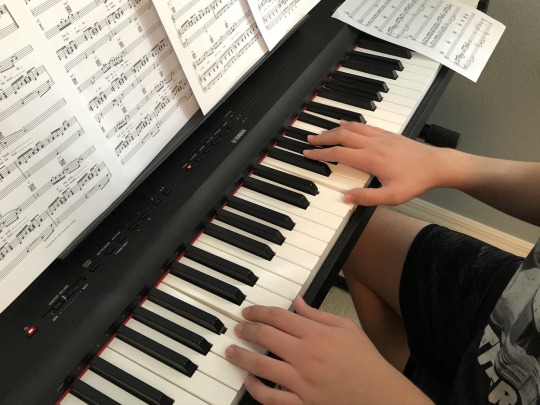
View On WordPress
0 notes
Text
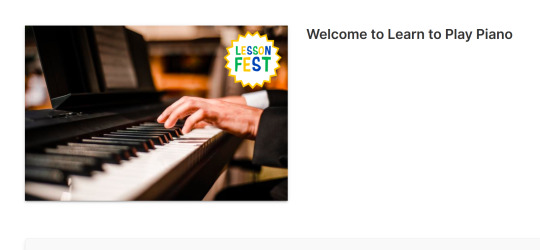
Sign up for a Piano Group Class ,,Learn to Play Piano '' today! If you are interested to start learning piano , our group classes at Lessonface make learning piano fun, interesting and inspiring !
Register here : https://www.lessonface.com/content/learn-play-piano
#lessonsface#gabriel latis#group class#learn to play piano#piano online#pianolessons#group piano lessons#piano lessons near me#abrsm#trinity
0 notes
Text
Music Theory 101: Build a Solid Foundation
The global pandemic has dramatically changed our daily lives, forcing many to stay at home. While this has brought numerous challenges, it has also provided a unique opportunity for self-improvement and personal growth. One of the most rewarding ways to use this time is by mastering a musical instrument. Whether you are a complete beginner or an experienced musician looking to refine your skills, mastering an instrument can be a fulfilling and enriching experience. This ultimate guide will help you make the most of your time at home by providing a step-by-step approach to mastering an instrument.
Choosing the Right Instrument: The first step in mastering an instrument is choosing the right one for you. Consider the following factors:
Personal Interest: Select an instrument that you are genuinely interested in. Your enthusiasm will keep you motivated.
Physical Considerations: Some instruments require specific physical attributes. For example, the size of your hands may affect your ability to play the guitar or piano comfortably.
Practicality: Consider the space you have at home and your budget. Instruments like keyboards and guitars are more space-efficient and affordable compared to grand pianos or drum kits.
Genre Preference: Think about the type of music you enjoy. If you love classical music, a violin or piano might be suitable. If you prefer rock or pop, consider the guitar or drums.
Setting Up a Practice Schedule: Consistency is key to mastering any skill. Setting up a practice schedule will help you stay disciplined and make steady progress.
Daily Practice: Aim to practice every day, even if it’s just for a short period. Consistent daily practice is more effective than sporadic long sessions.
Time Management: Decide on a time that works best for you. Some people prefer practicing in the morning, while others might find evenings more suitable.
Goal Setting: Set specific, achievable goals for each practice session. This could be learning a new scale, mastering a difficult piece, or improving your timing.
Breaks and Rest: Avoid burnout by taking regular breaks during practice sessions. Short breaks help maintain focus and prevent fatigue.
Utilizing Online Resources: The internet is a treasure trove of resources for learning and mastering an instrument.
Online Tutorials: Websites like YouTube offer countless free tutorials for all levels and instruments. Channels like JustinGuitar for guitar or Piano Lessons on the Web for piano are excellent starting points.
Virtual Lessons: Many professional musicians offer virtual lessons. Platforms like Lessonface and TakeLessons connect students with qualified instructors for one-on-one lessons.
Sheet Music and Tabs: Websites like MuseScore and Ultimate Guitar provide free access to sheet music and tabs for various songs and genres.
Practice Apps: Apps like Yousician and Simply Piano offer interactive lessons and feedback, making practice more engaging and effective.
Tracking Progress: Keeping track of your progress is crucial for staying motivated and identifying areas for improvement.
Practice Journal: Maintain a practice journal to record what you practice each day, what you achieved, and what you need to work on next.
Recording Yourself: Regularly record your practice sessions. Listening to these recordings can help you hear your progress and identify areas that need improvement.
Performance Milestones: Set performance milestones, such as playing a piece flawlessly or performing in front of family and friends. These milestones give you something to strive for and celebrate.
Feedback: Seek feedback from more experienced musicians or instructors. Constructive criticism can provide valuable insights and help you improve faster.
Staying Motivated: Maintaining motivation is often the hardest part of mastering an instrument, especially when progress seems slow.
Variety in Practice: Mix up your practice routine to keep things interesting. Practice different pieces, scales, and techniques to avoid monotony.
Join a Community: Connect with other musicians through online forums, social media groups, or local music clubs. Sharing your journey with others can provide support and encouragement.
Set Long-Term Goals: Think about what you want to achieve in the long run. Whether it’s performing at a concert, joining a band, or simply playing for personal enjoyment, having a clear goal can keep you motivated.
Reward Yourself: Celebrate your achievements, no matter how small. Rewarding yourself for reaching milestones can make the learning process more enjoyable.
Mastering an instrument while being stuck at home can be a deeply rewarding experience. It not only provides a productive use of your time but also enhances your creativity, discipline, and emotional well-being. By choosing the right instrument, setting up a consistent practice schedule, utilizing online resources, tracking your progress, and staying motivated, you can make significant strides in your musical journey. Remember, the key is to enjoy the process and celebrate every bit of progress along the way. So pick up that instrument, start practicing, and unlock your musical potential!
We’d love to hear about your musical journey! What instrument are you learning, and what progress have you made so far? Share your experiences, challenges, and triumphs in the comments below. Let’s support each other in our quest to master our instruments!
If you found this guide helpful, Follow us for more tips and resources on mastering your musical skills.
0 notes
Text
Best Spanish Guitar Classes in Uttarakhand
To find Spanish guitar classes in Uttarakhand, consider checking with local music schools, academies, or private instructors. Online platforms such as Superprof, Lessonface, or TakeLessons might also connect you with guitar teachers offering lessons remotely.

The Spanish guitar, also known as the classical guitar, is a beautiful and versatile instrument with several important parts. Understanding these components can provide insights into how the instrument produces its unique sound. Additionally, composing music for the Spanish guitar involves creativity, knowledge of musical theory, and an understanding of the instrument's capabilities. Here are the important parts of the Spanish guitar and some tips on composing for it:
Important Parts of the Spanish Guitar:
Body:
The body of the guitar is typically made of wood and is responsible for producing sound.
The shape and size of the body influence the guitar's tone and resonance.
Soundhole:
The soundhole allows air to move in and out of the body, contributing to the guitar's resonance.
It plays a crucial role in shaping the instrument's sound.

Neck:
The neck is the long, usually wooden, part of the guitar that connects the body to the headstock.
Fretted with metal strips, the neck determines the pitch of the notes played.
Fingerboard:
The fingerboard is the flat surface on the front side of the neck.
It is usually made of a dense wood like ebony or rosewood and contains the frets.
Frets:
Metal strips embedded in the fingerboard that divide it into segments.
Pressing the strings against different frets changes the pitch of the notes.
Strings:
Typically made of nylon or a combination of nylon and other materials.
Spanish guitars usually have six strings, each tuned to a specific pitch.
Headstock:
The headstock is located at the end of the neck and houses the tuning pegs.
Tuning pegs are used to adjust the tension of the strings and, consequently, their pitch.
Tuning Pegs:
The small, usually cylindrical pegs on the headstock that allow for tuning adjustments.
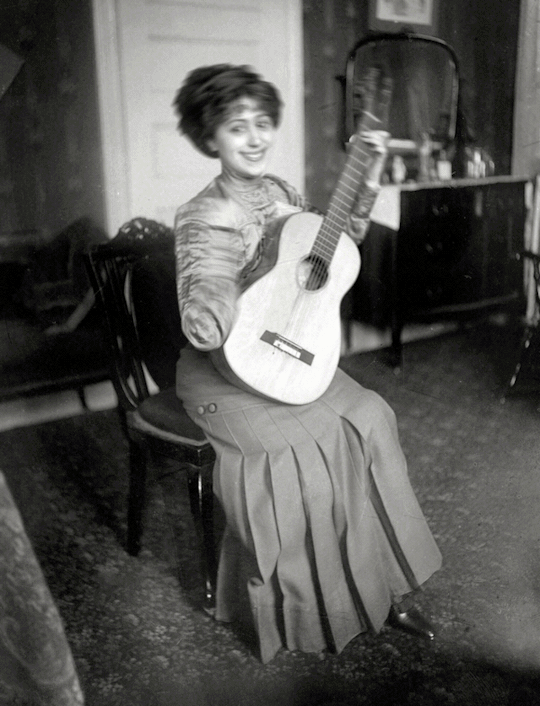
Composing Music for Spanish Guitar:
Understand the Instrument:
Familiarize yourself with the Spanish guitar's tonal characteristics and capabilities.
Experiment with different playing techniques, such as fingerpicking and strumming.
Explore Chord Progressions:
Spanish guitar music often features emotive chord progressions. Experiment with chords that evoke the desired mood.
Melody and Harmony:
Develop captivating melodies that can stand alone or complement accompanying harmonies.
Explore the interplay between melody and harmony to create depth in your composition.
Rhythmic Variations:
Utilize rhythmic patterns and variations to add flair to your composition.
Experiment with different strumming and picking patterns.
Use Ornamentation:
Incorporate ornamentation techniques such as trills, slides, and vibrato to enhance expressiveness.
Explore Modal Scales:
Experiment with different modal scales to achieve distinctive sounds associated with Spanish and flamenco music.
Dynamic Changes:
Create dynamic contrast by varying the intensity of your playing. Explore soft and loud passages for emotional impact.
Cultural Influences:
Draw inspiration from Spanish and Latin American musical traditions.
Listen to and analyze compositions by renowned Spanish guitarists for inspiration.
Improvise:
Allow for improvisation within your composition. This adds a personal touch and spontaneity to your music.
Record and Review:
Record your compositions to listen critically and make adjustments.
Seek feedback from fellow musicians or instructors to refine your work.
Remember, composing for the Spanish guitar is a creative process that involves exploring the instrument's capabilities and expressing your unique musical voice. Experimentation and a deep understanding of the instrument will contribute to the richness of your compositions.

Cities of Uttarakhand:
Uttarakhand, a state in northern India, is home to several cities and towns. Some major cities in Uttarakhand include:
Dehradun
Haridwar
Rishikesh
Nainital
Mussoorie
Almora
Haldwani
Rudrapur
Pithoragarh
Chamoli
History of Spanish Guitar:
The Spanish guitar, or classical guitar, has its roots in Spain and has a rich history:
Origins in Spain: The guitar, as we know it today, evolved in Spain from earlier instruments like the lute and vihuela.
Renaissance and Baroque Periods: The guitar gained popularity during the Renaissance and Baroque periods in Europe. In Spain, it became an integral part of folk and classical music.
19th Century Developments: In the 19th century, Spanish luthier Antonio Torres revolutionized the design, giving birth to the modern classical guitar.
Role of Playing Spanish Guitar:
Expressive Melodies:
The Spanish guitar is known for its ability to convey expressive melodies and emotions through its rich and warm tones.
Versatility:
It is a versatile instrument suitable for various musical genres, including classical, flamenco, folk, and contemporary styles.
Cultural Connection:
Playing the Spanish guitar allows individuals to connect with the cultural heritage of Spain and the broader world of classical music.

Top Spanish Guitar Players in Uttarakhand:
I don't have real-time information on specific guitar players in Uttarakhand, but you may discover talented local musicians by attending music events, checking out local performances, or reaching out to music communities in the region.
Top Places to Visit in Uttarakhand:
Jim Corbett National Park: India's oldest national park, known for its diverse wildlife.
Valley of Flowers: A UNESCO World Heritage Site renowned for its alpine meadows and vibrant flowers.
Har Ki Dun: A trekker's paradise with breathtaking landscapes.
Rishikesh and Haridwar: Sacred cities along the Ganges River, famous for spirituality and adventure sports.
Nainital: A charming hill station with a beautiful lake and colonial architecture.
Curriculum of Spanish Guitar for Students:
A typical curriculum for Spanish guitar students might include:
Introduction to the Guitar:
Understanding the different parts of the guitar.
Proper posture and hand positioning.
Basic Chords and Strumming:
Learning fundamental chords (e.g., C, G, D, Em).
Basic strumming patterns.
Fingerpicking Techniques:
Introduction to fingerstyle playing.
Developing fingerpicking patterns.
Reading Sheet Music and Tablature:
Understanding musical notation and tablature.
Melody and Solo Playing:
Playing simple melodies and solos.
Understanding scales and improvisation.
Genre Exploration:
Introduction to different genres (classical, flamenco, folk).
Playing pieces from various styles.
Advanced Techniques:
Advanced fingerstyle techniques.
Exploring extended chords and harmonic concepts.
Performance Skills:
Building confidence in playing for an audience.
Interpretation and expression in performance.
Remember that the curriculum can vary based on the student's level, goals, and the instructor's teaching approach.

**About Pratanu Banerjee - Pratanu Banerjee is a teacher of keyboard, harmonica, flute, Spanish guitar, music therapy, reiki, money reiki, angel reiki, kundalini reiki, angel reiki, reiki grandmaster, holy fire reiki, unicorn reiki, emotional empowerment technique, self hypnosis, french, English, anthropology, hospital administration etc. These are certificate courses by Pratanu Banerjee at Institute of performing art and mind power development affiliated under world art organization. Cal 91–8017517171 **
#spanish guitar#guitar#online course#uttarakhand#online guitar classes#guitar tutor#online tutor#certificate course
0 notes
Link
Give the Gift of Music with Lessonface's Piano Pass. For one flat fee, you or your child can take daily piano lessons in the Piano Pass piano classes.
0 notes
Text
Cello
If you saw yesterday's post and are thinking about getting into taking up an instrument like say cello, please let me know and sign up for a time slot with me for cello lessons.
book on the Facebook booking button.
https://linktr.ee/Rozcocello?fbclid=IwAR1LbQlARRlvWGqyTxYfIHhvNd4BKSkJOlq5hiSg3-2kIQ_r4tUZcohX0XE
OR
Lessonface
https://www.lessonface.com/instructor/alberto-orozco-osollo?ref=2f77a4b9
0 notes
Video
youtube
Lyrical Guitarist Melanie Faye Discusses the Number System
Phenomenal guitarist Melanie Faye came to the Lessonface studio to share some of her experience with the Nashville Number System and her approaches to creating a unique sound on the guitar.
0 notes
Text
Top Flute Teachers in Gujarat
While I don't have real-time information on specific flute teachers, you can find top flute teachers in Gujarat by exploring local music schools, academies, or online platforms such as Superprof, Lessonface, or TakeLessons. Additionally, consider asking for recommendations from local musicians or checking with music stores for information on experienced flute teachers in Gujarat.
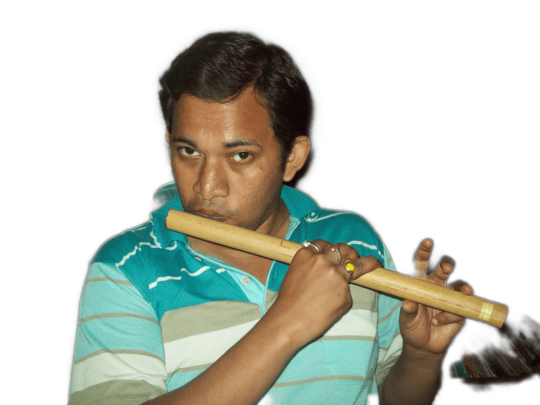
Cities in Gujarat: Gujarat is a state in western India with several cities. Some of the major cities in Gujarat include:
Ahmedabad Surat Vadodara (Baroda) Rajkot Bhavnagar Jamnagar Gandhinagar Junagadh Gandhidham Anand Role of Flute for Students in Gujarat: Cultural Enrichment:
Learning the flute allows students in Gujarat to connect with their cultural heritage, as the flute plays a significant role in traditional Indian music. Musical Education:
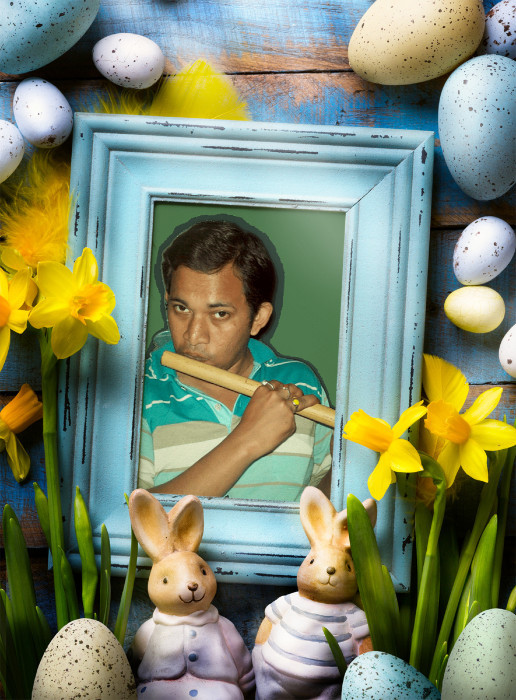
The flute is an excellent instrument for students to begin their musical education. Its melodic and expressive nature helps students understand musical concepts and develop a strong foundation in music. Artistic Expression:
Playing the flute provides students with a means of artistic expression. It allows them to convey emotions and tell stories through music. Community Engagement:
Students learning the flute in Gujarat can participate in local music communities and events, fostering a sense of community engagement and collaboration. Career Opportunities:
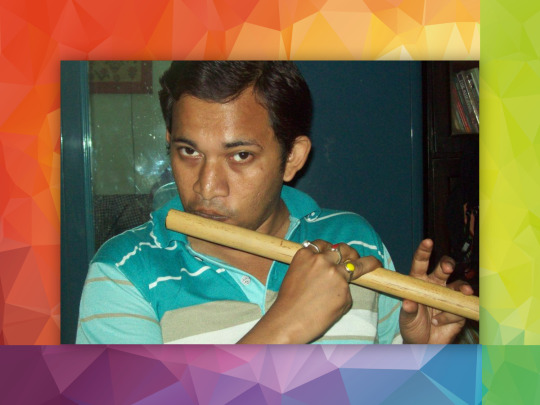
For those passionate about music, mastering the flute can open doors to various career opportunities, including becoming professional musicians, educators, or performers. History of Flute in Gujarat: Gujarat has a rich cultural and musical history, and the flute has been a part of its traditional music for centuries. While specific details about the history of the flute in Gujarat may not be readily available, it is likely that the flute, like in other regions of India, has been used in religious, folk, and classical music contexts.
The historical significance of the flute in Gujarat may be traced through its role in local festivals, rituals, and cultural performances. Traditional compositions and regional styles of playing may have influenced the way the flute is taught and learned in Gujarat.
To delve deeper into the history of the flute in Gujarat, one might explore local archives, music institutions, or consult with experienced musicians and historians in the region.

**About Pratanu Banerjee - Pratanu Banerjee is a teacher of keyboard, harmonica, flute, Spanish guitar, music therapy, reiki, money reiki, angel reiki, kundalini reiki, angel reiki, reiki grandmaster, holy fire reiki, unicorn reiki, emotional empowerment technique, self hypnosis, french, English, anthropology, hospital administration etc. These are certificate courses by Pratanu Banerjee at Institute of performing art and mind power development affiliated under world art organization. Cal 91–8017517171 **
0 notes